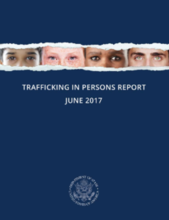The Trafficking in Persons Report is an annual publication of the U.S. Department of State, providing a snapshot of human trafficking around the world with attention to key issues, trends, standards, and updates. The 2017 Report focuses on enhancing criminal accountability and addressing the challenges associated with prosecution efforts. Children living in residential care in several countries were reported to be particularly vulnerable to trafficking, with reports of children being trafficked into forced labor and criminality, child pornography, sexual exploitation and prostitution, use by armed groups, and illegal adoptions.
Methodology
The Department of State prepared this Report using information from U.S. embassies, government officials, nongovernmental and international organizations, published reports, news articles, academic studies, research trips to every region of the world, and information submitted to tipreport@state.gov. This email address provides a means by which organizations and individuals can share information with the Department of State on government progress in addressing trafficking.
U.S. diplomatic posts and domestic agencies reported on the trafficking situation and governmental action to fight trafficking based on thorough research that included meetings with a wide variety of government officials, local and international NGO representatives, officials of international organizations, journalists, academics, and survivors. U.S. missions overseas are dedicated to covering human trafficking issues year-round. The 2017 Trafficking in Persons Report covers government efforts undertaken from April 1, 2016 through March 31, 2017.
Mention of trafficking of children into orphanages in Nepal
For the first time in history, the 2017 TIP Report recognizes the recruitment of children into children's homes as a form of child trafficking (p. 296):
Under false promises of education and work opportunities, Nepali parents give their children to brokers who instead take them to frequently unregistered children’s homes in urban locations, where they are forced to pretend to be orphans to garner donations from tourists and volunteers; some of the children are also forced to beg on the street.

